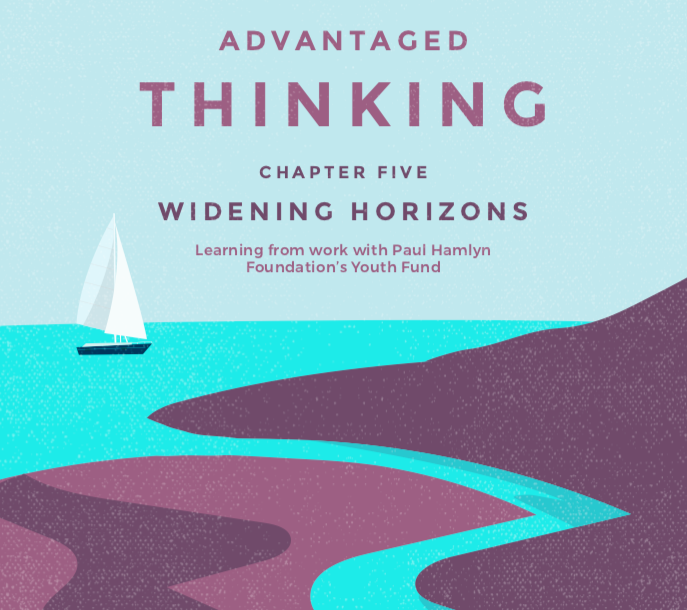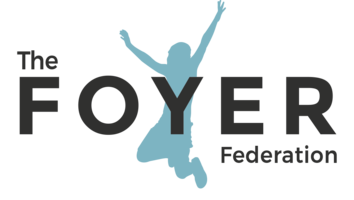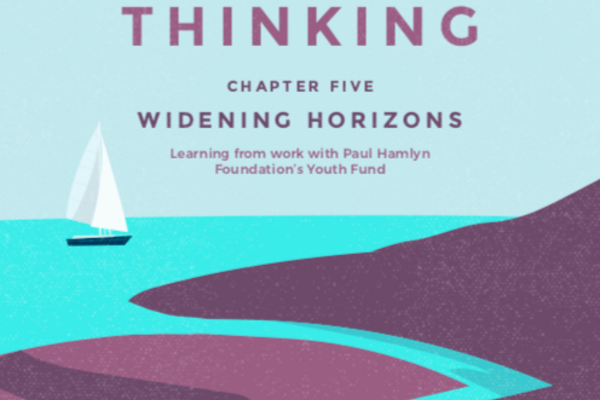
“Sometimes the vision of our horizon has been set by our family, teachers, community or peers. Just like the real horizon, it is an imaginary line and not the limit of our potential – but it can be if we don’t know or believe that there is a world beyond the horizon.” Paul Rogers, Northside Partnership
“We want people, not posters. Meaning, not means-testing. More love and trust instead of rules.” Young people from InspireChilli research workshops
Even with a good understanding of Advantaged Thinking principles, putting it into practice can be daunting. How do you decide what steps to take? What do young people think is important? And how do you sustain Advantaged Thinking in your organisation? Widening Horizons is the fifth chapter in our Advantaged Thinking journey series. Here we share learning from Colin Falconer’s InspireChilli consultancy work supporting Paul Hamlyn Foundation’s Youth Fund.
Where to start?
The Paul Hamlyn Foundation aims for a just society in which everyone, especially young people, can realise their full potential and enjoy fulfilling and creative lives. Their Youth Fund supports organisations whose main purpose is working with and for young people who face complex transitions to adulthood, and they only fund organisations that are committed to continuous improvement in asset-based approaches to working with and for young people.
As a leading proponent of asset-based work, the Paul Hamlyn Foundation commissioned InspireChilli to support understanding of where and how organisations can develop their asset-based practice. From this work came ten identified characteristics that matter most to young people, along with practical steps that can advance impact approaches through an Advantaged Thinking methodology.
The fifth chapter of Adventures in Advantaged Thinking looks at:
- Introducing asset-based approaches with people
- What matters most for people using asset-based services
- What matters for impact and evaluation
- Taking action from asset-based learning
- Relentless leadership for Advantaged Thinking
Key Learnings:
- People stand out – not posters or policies. The quality and character of staff is more important to people using a service than any specific tools, policies or strategies. Direct interaction with staff is more valued and appreciated than any other channel of communication or support.
- Impact and evaluation work should always be in line with an organisation’s vision and values. For Advantaged Thinking, this means taking approaches that clearly promote an asset-based focus. Focus on what matters to people more than what is the matter with people.
What are we doing?
We are consistently learning and upgrading our monitoring, evaluation and learning practices to ensure we are measuring what matters to young people and Foyers, in ways that work for them. This year we have run a range of insight gathering exercises, including our Big Questions survey, which directly secured feedback from young people in Foyers on their priorities, concerns and aspirations for the future. This information has been analysed and published on our website and shared with our network, and has already influenced our priorities for the coming year. Young people told us in no uncertain terms that mental health is their biggest priority and cause for concern, and they want to see better, more accessible mental health support for young people in Foyers. Therefore, we are actively seeking funding for work in this area and speaking to external partners and Foyers about ways we can implement change in this area.
Moreover, we are working with our network to ensure that we only gather data we need and use. We have tweaked the demographic questions we ask to ensure that we know who our Foyers work with, so we are better able to design programmes and support to meet their needs.
Finally, we are unwavering in our commitment to relentless leadership in Advantaged Thinking. We take every opportunity to invest in caring, nurturing relationships and effective systems in order to maximise our effectiveness and impact. To this end, we have recently relaunched www.foyer.net with improved functionality and access to a directory for members, so Advantaged Thinkers can connect and support one another more easily.
Inspiration from around the sector
Paul Hamlyn Foundation
Paul Hamlyn Foundation is one of the largest independent grant-makers in the UK. They support social change, working towards a just and equitable society in which everyone, especially young people, can realise their full potential and enjoy fulfilling and creative lives. They have embraced and developed asset based ways of working in their funding practices and in partnership with those they fund:
“Supporting organisations to embrace asset based working is a constant journey of discovery – in funding these approaches we have learnt so much about what asset based working looks like in practice, how it plays out in purpose, values, culture, people, service delivery, decision making, operations, influencing and ultimately in impact for young people. We have created some structure, frameworks, tools and resources but also realised that there is no one size fits all approach. It’s not making one change or using one tool. It’s a philosophy, backed up by behaviours, and it takes effort and commitment from staff and young people. It’s about how work is carried out, who is leading the work, it’s about the process, the relationships and the quality of both as key in achieving ambitions with and for young people. The starting point is identifying what you are already doing in an asset based way and building from there. Asset based working is not a destination - it’ll always be a work in progress.” Ruth Pryce - Head of Programme: Young People
As part of their work, they have produced a wealth of information and resources to support organisations in their journey to asset based ways of working. Here are some of our favourites:
- Illuminating asset-based working: three case studies from organisations working in asset-based ways: https://www.phf.org.uk/blog/illuminating-asset-based-working/
- Control and trust – The challenges of breaking the mould: a different approach to evaluation to generate learning when you fund based on trust: https://www.phf.org.uk/blog/control-and-trust-the-challenges-of-breaking-the-mould/
- Asset-based work with young people: Findings from the Youth Fund evaluation: a framework to help organisations identify different ways in which they can apply asset-based working in practice: https://www.phf.org.uk/publications/asset-based-work-with-young-people-findings-from-the-youth-fund-evaluation/
- Investing in young people to achieve positive change – it’s not what you do, it’s the way that you do it: how a focus on values, culture, people and on continuous improvement makes such a difference: https://www.phf.org.uk/blog/investing-young-people-achieve-positive-change-not-way/
Examples from Paul Hamlyn Foundation funded orgs - RECLAIM:
RECLAIM empowers young working-class people to change the country today and lead it tomorrow. RECLAIM has supported over 750 young people to develop and implement manifestos for social change in their communities. The original programme graduates are now in their 20s and becoming the next generation of leaders for the organisation. Funding from Paul Hamlym Foundation supported RECLAIM to develop an alumni network as well as continuing to support young people to campaign for social change on the issues affecting them. They work closely with their Youth Board, which is made up of working-class young people who represent their peers, raise issues and are fundamental to the charity's decision making.
Examples from Paul Hamlyn Foundation funded orgs - Beatfreeks:
Beatfreeks is a creative youth engagement agency that offers peer-led programmes, activities and platforms which empower young people as leaders, creators, decision makers and mentors. They were supported by Paul Hamlyn Foundation to pilot a national youth trends survey to gather insight from young people to ensure that services and support reflect their needs. In October 2020, Beatfreeks shared their insights and knowledge from their Take the Temperature report with our network, sharing the reality of nearly 2,000 young people across the UK of how the Covid-19 pandemic affected their lives. Beatfreeks at its core works with young people to use their creativity to change society by connecting them to business, government and funders with opportunities to influence how the world works.
Reflection Questions:
Q1. How could you strengthen your service in any areas that matter to young people?
Q2. Do your impact approaches align with an Advantaged Thinking vision?
Q3. What actions should you prioritise in response to feedback from young people and learning from your impact measurement?






